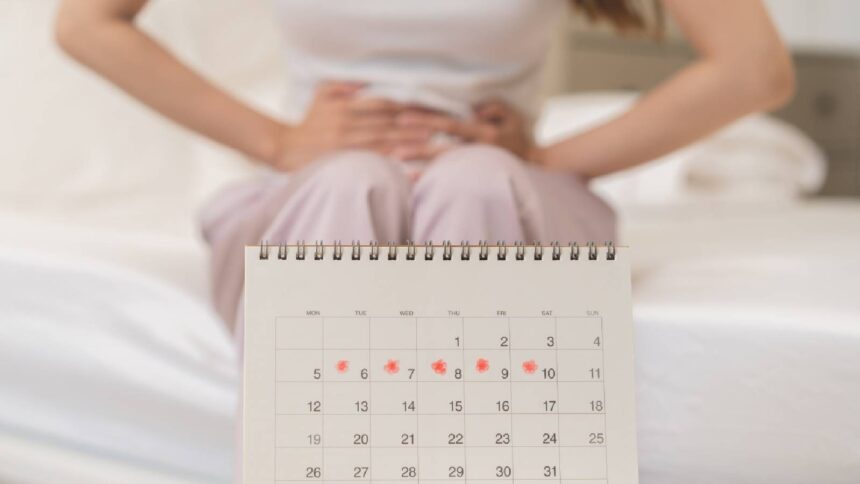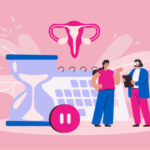Irregular periods after pregnancy are very common. Check out how some women experience period issues and deal with them.
The happiness of having a baby is unparalleled, but postpartum can be a difficult time for new moms. She deals with sleepless nights and unbalanced hormones, so irregular periods after pregnancy are also very common. They can occur at hormonal changes, breastfeeding, and even at high stress levels experienced by new moms. However, irregular periods after pregnancy can be natural. If they continue this way for a while, or if they have severe pain and convulsions, you should go to a doctor. Below is everything you need to know about changes in your menstrual cycle after pregnancy and how to deal with them.
Is irregular periods after pregnancy common?
Yes, women experience irregular periods after pregnancy as a result of hormonal changes while their bodies recover from childbirth. A study published in the journal Cureus states that changes in hormonal progesterone and estrogen levels can lead to irregular periods. If you are breastfeeding, prolactin, the hormone that stimulates milk production, can inhibit ovulation, causing skipping or irregular periods for several months, explains gynecologist Sandhya Rani.

Even if you are not breastfeeding, it can take several cycles for your menstrual cycle to stabilize while your body is used to it. Other reasons such as stress, insomnia, and dietary defects can also lead to irregular periods. However, if the irregularity is long-term or if you have severe symptoms, it is best to visit a gynecologist.
Causes of irregular periods after pregnancy
There are many causes for irregular periods after pregnancy. This is why you don’t get your period in time:
1. Hormonal imbalance
The body experiences incredible hormonal changes during pregnancy, particularly estrogen and progesterone fluctuations. It may take some time for the hormones to settle down after giving birth, causing irregular menstrual cycles. “If women are breastfeeding, the hormone prolactin, which helps in milk production, can interfere with ovulation, which can disrupt the menstrual cycle,” says an expert. Even breastfeeding mothers can take months for their bodies to return to normal hormone levels.
2. Breastfeeding and prolactin effects
Breastfeeding is often the cause of menstrual abnormalities. When her mother breastfeeds, her prolactin levels are high and she suppresses the secretion of reproductive hormones such as estrogen and progesterone. Inhibition can cause delayed ovulation and complete loss of menstruation (breastfeeding amenorrhea). Breastfeeding women say they have longer periods of amenorrhea and infertility after birth than women who are not breastfeeding. This means that fully breastfeeding women may not receive a period of several months, while partially breastfeeding women may have irregular or unpredictable periods before their child is weaned.
3. Physical and emotional stress
Postpartum time is very physically and emotionally stressful for the mother. Lack of sleep, a new schedule, and healing your body after giving birth can all be a source of stress for her. Stress affects the hypothalamus, a region of the brain that regulates hormone secretion. This can interfere with ovulation and menstrual cycle. Increased levels of cortisol from stress can also confuse menstrual cycles, slowing them down and changing the flow, the study has been published in International Psychophysiology.
4. Uterine recovery and postpartum healing
After delivery, the uterus will shrink to its pre-pregnancy size. The woman has been bleeding after birth for several weeks, but this is not a period of time, but a fall out of the uterine lining of the pregnancy. The lining of the uterus and endometrium takes time and returns to normal, causing delays and confusion in the menstrual cycle. In some cases, conditions such as placental tissue retention and postnatal infection can also affect predictability of duration.
5. Weight and nutritional deficiency
Pregnancy and childbirth excrete the body’s nutrient storage. Nutrient storage, when combined with loss of anorexia, can affect menstrual health. Deficiencies in iron, calcium, vitamin D, and other major nutrients affect hormonal balance and ovulation, leading to irregular periods after pregnancy. Additionally, extreme weight loss or increase after pregnancy can interfere with the cycle. Sudden weight loss can cause periods of overlooked, but weight gain can lead to hormonal imbalances. Especially when it is related to conditions such as insulin resistance.
6. Other underlying medical conditions
Some medical conditions are also the reasons for the irregular period after pregnancy. These can occur or become more severe after pregnancy, causing irregular menstrual cycles. Conditions such as polycystic ovarian syndrome, thyroid symptoms (hypothyroidism or hyperthyroidism), and diabetes all affect the menstrual cycle. Pregnancy complications, including postpartum thyroiditis (reversible thyroid symptoms that can occur after birth), can affect the body’s hormonal balance and can lead to irregular periods. If the interval does not decrease over time, it is important to consult your gynecologist to rule out other underlying conditions.

When are you going to the doctor?
Irregular periods after pregnancy are natural, but there are a few things to be aware of. If the economy is irregular for more than a few months after weaning, or is extremely severe, painful, or with severe convulsion, dizziness or abnormal discharge, you should consult a doctor, experts say. You should also consult your doctor if you suddenly stop taking the period, experience symptoms of hormonal imbalance, or suspect an underlying condition such as PCOS or thyroid problems.
How to normalize the period after pregnancy?
The right way to deal with irregular periods after pregnancy is to focus on consuming a balanced diet full of iron, calcium and essential vitamins to balance your hormone levels. It normalizes a type of physical activity, such as walking and yoga, to maintain hydration and improve overall health. Stress management through relaxation methods such as meditation and breathing can also stabilize hormone levels and help with irregular periods after pregnancy.
Even if it means adjusting to your baby’s rhythm, make sure you sleep well. If you are breastfeeding, keep in mind that it may take some time for the cycle to return. However, if the irregular period continues to last for a long time after pregnancy, be sure to consult your doctor.
Related FAQs
When does the period usually occur after pregnancy?
The duration usually returns within 6-8 weeks of birth for non-producer mothers, but breastfeeding mothers may experience delays until several months or even start weaning.
When will it be regularly completed after pregnancy?
The duration will usually be regular within 3-6 months of return, but this may vary depending on factors such as breastfeeding, stress, and hormonal balance.












